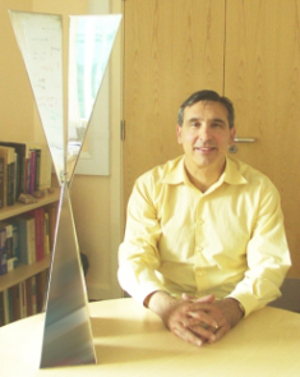 |
|
Fig. 1:
Professor Carlos Frenk (Durham University)
Image Credit: University of Durham
|
|  |
Following a well-established tradition, this year the MPA invites
Prof. Carlos Frenk from Durham University to spend the month of June
in the Munich area as Biermann lecturer. Professor Frenk is currently
director of the Institute for Computational Cosmology at Durham
University, where his group develops cosmological models and
simulations. He is also co-Principal Investigator of the Virgo
Consortium, which was founded in 1994 and is perhaps best known for
the Millennium Simulation, carried out in Garching and first published
in 2005. At the time, this N-body simulation of the dark matter
distribution was the largest ever carried out, and was particularly
notable because it included techniques which allowed the development
of the galaxy population to be followed in detail, in addition to
tracking the growth of structure in the dark matter.
Such cosmological simulations are based on the standard cold dark
matter model of cosmic structure formation, which was established by
the astronomical "Gang of Four": In a series of five landmark papers
from 1985 to 1988, Marc Davis, George Efstathiou, Carlos Frenk, and
Simon White showed that observations of galaxies, clusters, filaments,
and voids were consistent with a simulated universe that had evolved
under the dominant gravitational influence of cold dark matter. In
2011, the four researchers received the Gruber Cosmology Prize for
this discovery and for their pioneering use of numerical
simulations. In addition to this latest award, Carlos Frenk has
received a number of other prizes and distinctions, such as Hoyle
Medal of the Institute of Physics, the George Darwin Prize of the
Royal Astronomical Society and the Daniel Chalonge medal from the
Observatoire de Paris.
The Biermann lecture series, which started in 1997, aims to stimulate
scientific activity across the Munich astronomical community and has
been very successful in previous years. World-class scientists working
on topics in theoretical and computational astrophysics are invited to
spend one month in Garching, to give a series of three lectures and to
interact with colleagues from the various Munich/Garching institutes.
Biermann lectures 2013 by Professor Carlos Frenk (Durham University)
"The vicissitudes of the cold dark matter model of cosmogony"
Tuesday, June 4:
"Galaxy formation models: myth and reality"
Tuesday, June 18:
"The cosmic large-scale structure"
Wednesday, June 19:
"Cosmology in our backyard: challenges to the standard model"
All lectures will start at 15:30 in the large MPA seminar room E.0.11
and will be preceded by tea, coffee and cookies at 15:15.
|


